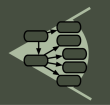





|
|


|
|
||
 |
|
|
This is version 10.
It is not the current version, and thus it cannot be edited. IntroductionBroad-scale ecological studies often require information assembled from multiple disciplines including biology (e.g., genetics, physiology, and paleontology), the physical sciences (e.g., geography, meteorology, and hydrology), and increasingly the social sciences (e.g., economics and sociology). In such studies, data heterogeneity creates major informatics challenges that include the need to better discover, access, interpret, and integrate relevant data that have been collected by others. Despite the advances made using metadata and community-wide data networks, science needs robust, open, and generic software systems that address the semantic ambiguities of heterogeneous data. New strategies for managing observational data are needed so that systems can better interpret the semantics of observations to resolve issues impeding synthesis. For these systems to interoperate effectively, however, the scientific community must first unify the various existing approaches for representing observational data. A community-sanctioned data model for ecological and environmental observational data will provide an important mechanism for informatics efforts to enable interoperability among existing data resources, ultimately leading to more improved, comprehensive, cross-disciplinary synthetic research.
Workshop ObjectivesThe objectives of this workshop will be to discuss and define the features and requirements for a unified data model of observational data that can be shared across ecological and environmental sciences, and to clarify the infrastructure necessary for the scientific community to develop, maintain, and support such a model. The objectives for this proposed workshop constitute five distinct tasks: (1) define “observational data”; (2) specify the capabilities enabled by a shared model for observational data; (3) critically review existing models for observational data, in light of earlier points above, and clarify the advantages and challenges of creating a shared framework for capturing observational data; (4) enumerate specific requirements for a shared model for observational data; and (5) discuss the issues associated with creating and maintaining a shared model for observational data with a community-wide, open-participation effort.
General Information
Participants
|
| This material is based upon work supported by the National Science Foundation under award 0619060. Any opinions, findings and conclusions or recomendations expressed in this material are those of the author(s) and do not necessarily reflect the views of the National Science Foundation (NSF). Copyright 2007 |